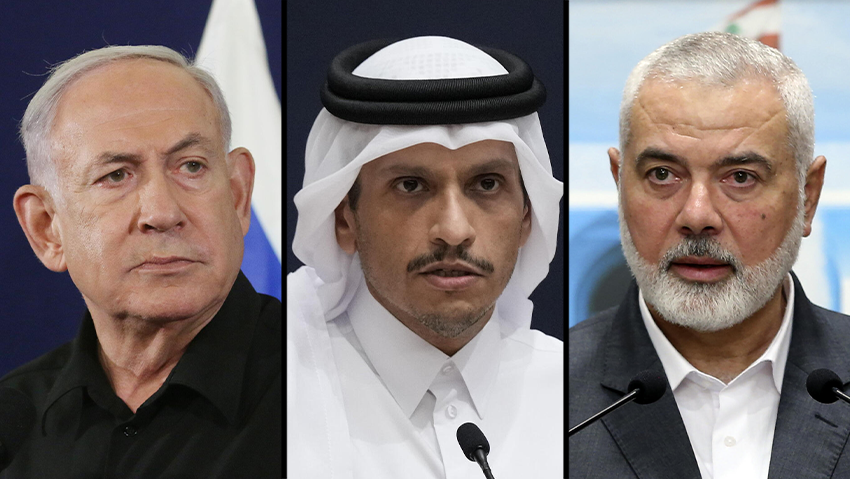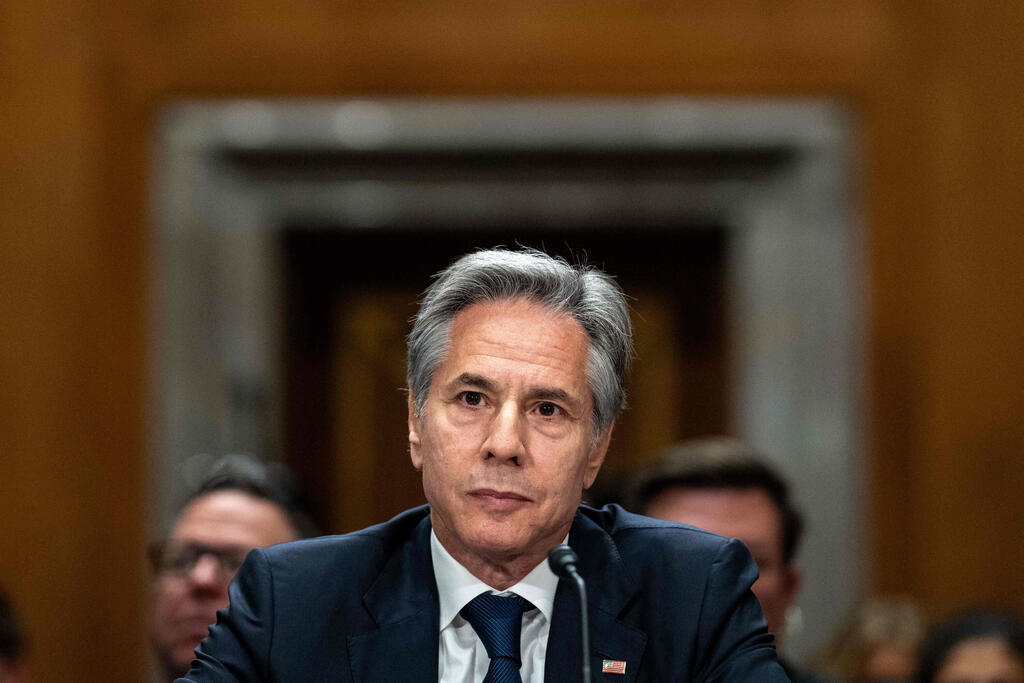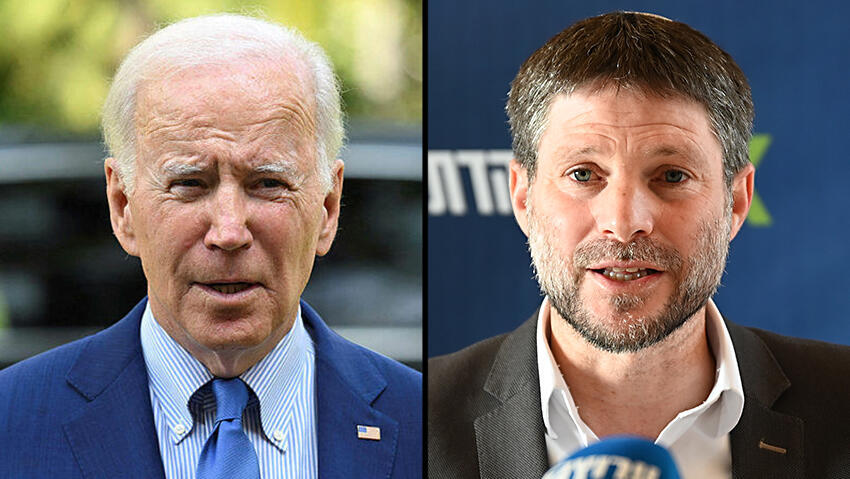Getting your Trinity Audio player ready...
Qatar has threatened to expel senior Hamas officials from Doha if the terrorist group does not accept a deal for the release of Israeli hostages and an end to the war in the Gaza Strip, CNN reported on Thursday.
A U.S. official said that Qatar has been warning Hamas for months that its members could be expelled, and now the country has issued a concrete threat following repeated requests from U.S. President Joe Biden and public criticism from Israel.
3 View gallery


Prime Minister Benjamin Netanyahu, Qatari Prime Minister Mohammed Al Thani and Hamas politburo leader Ismail Haniyeh
(Photo: Dana Kopel, Dalati Nohra/Lebanese Official Government via AP, AP /Jacquelyn Martin, Pool)
As the Israel-Hamas war approaches its ninth month, U.S. officials also pressed Egypt and Turkey to increase pressure on Hamas using various leverage points. Multiple countries have been asked to threaten to freeze the bank accounts of Hamas members and restrict their regional travel, according to two U.S. officials who spoke to CNN. Historically, Hamas members have operated freely despite their group's designation as a terrorist organization.
U.S. State Department spokesperson Matt Miller said on Wednesday that the U.S. has observed both Egypt and Qatar “exert significant pressure on Hamas,” though he declined to elaborate on the specifics of these efforts.
“We have seen both countries play an incredibly important role in mediating this deal, making it clear that this deal is in the interests of the Palestinian people, and doing so appropriately,” Miller said.
U.S. officials privately note that Egypt is applying more pressure on Hamas than in the past, though the extent of Egypt’s private dialogue with the group remains unclear. They suggest the U.S. wants Cairo to threaten to cut off access points from Egypt to Gaza, a crucial lifeline for the enclave.
U.S. Secretary of State Antony Blinken has been engaged in extensive talks with key Middle Eastern leaders since Biden announced Israel's proposal for a deal last Friday. Numerous State Department officials have also participated in these discussions.
The U.S. continues to advocate for the deal, with Biden and 16 other world leaders urging Hamas to accept it, emphasizing Israel's readiness to move forward. However, U.S. officials admit there is no backup plan if Hamas rejects the deal.
3 View gallery


US Secretary of State Antony Blinken
(Photo: Kent Nishimura / GETTY IMAGES NORTH AMERICA / AFP)
Hamas’ expected refusal, as reported by the Hezbollah-affiliated Lebanese newspaper Al Akhbar, stems from clear statements by Israeli ministers and Knesset members indicating an intention to resume the war even after a hostage deal. The report claimed these statements explicitly revealed Israel's plan to renew hostilities post-deal. Hamas demands a clear framework to end the war with actionable mechanisms, dismissing U.S. guarantees as insufficient.
Since President Biden revealed the Israeli proposal, Prime Minister Benjamin Netanyahu has faced intense pressure from his government and coalition to reject what critics label a "surrender agreement," even though they have yet to review it.
In a meeting of Knesset's Foreign Affairs and Defense Committee, after facing criticism and threats, Netanyahu clarified he had not agreed to end the war as part of the deal, despite Biden’s remarks. "The outline presented by Biden is partial. The war will pause for the return of hostages, and then we will advance discussions. There are more details that the U.S. president did not disclose to the public," Netanyahu told committee members.
Just hours after Prime Minister Netanyahu accused President Biden of concealing parts of the deal, White House National Security Council spokesperson John Kirby responded: "This is an Israeli proposal, and Biden presented it accurately." Despite this confrontation, Washington officials have since clarified that Hamas is to blame for the lack of a finalized deal.
Concerns have emerged in Washington that Netanyahu may struggle to accept the Israeli proposal, partly due to threats from far-right ministers Itamar Ben-Gvir and Bezalel Smotrich to dismantle the coalition. These ministers demand that Netanyahu present the deal to the Security Cabinet. Their request is supported by Minister Benny Gantz, who, familiar with the deal’s details from War Cabinet discussions, has said that it should be disclosed to the expanded Cabinet members.
Meanwhile, the Wall Street Journal reported on Thursday that Hamas leader in Gaza Yahya Sinwar informed mediators through his envoys that the organization "will not surrender its guns or sign a proposal that asks for that." Sinwar emphasized that Hamas would agree to the proposed deal only if Israel commits to a permanent cease-fire. The newspaper previously reported that Sinwar is in no hurry to strike a deal, betting that Israel's international legitimacy for its war in Gaza is eroding day by day.
3 View gallery


US President Joe Biden and Finance Minister Bezalel Smotrich
(Photo: AFP, Nadav Eves)
This report, along with Qatar's threat, follows news that Hamas has effectively decided to reject the Israeli deal, claiming it is "substantially different" from the framework Biden outlined in his speech a week ago.
"After reviewing the contents of the Israeli proposal, it became clear that it is a framework that does not lay the correct foundations for the desired agreement, as it does not guarantee a permanent cease-fire but only a temporary one," read a document from the organization published in the London-based Arabic newspaper Asharq Al-Awsat.
Israeli officials, along with their counterparts in Doha, emphasize that no official response has yet been received from Hamas. Following reports of Hamas' alleged rejection of the deal, Prime Minister Netanyahu's office announced the cancellation of the War Cabinet and expanded Cabinet meetings scheduled for Thursday evening. No reason was provided for the cancellations, and the meetings are now expected to take place on Sunday, after Benny Gantz's deadline for leaving the government expires.
The primary obstacle to the deal remains the issue of ending the war, a point of contention for months. While Hamas demands a framework that ensures a complete cessation of hostilities and a full withdrawal of the IDF from Gaza, Netanyahu clarified, following President Biden's presentation of the Israeli proposal, that Israel could resume fighting after an initial six-week temporary cease-fire.
According to Biden, during the first phase, hostages categorized as humanitarian cases—including women, the elderly and the injured—will be released, initiating negotiations for the second phase. This phase would involve a total cease-fire, a full IDF withdrawal from Gaza, and the release of all remaining hostages.
Biden indicated that negotiations for the second phase would continue even if they extend beyond the six weeks of the first phase, and that the temporary cease-fire would remain in effect as long as talks are ongoing. However, Netanyahu, facing the threat of government collapse from Ben-Gvir and Smotrich, asserted that Israel could resume fighting if it deems the negotiations "fruitless."



